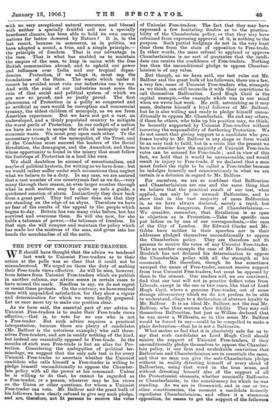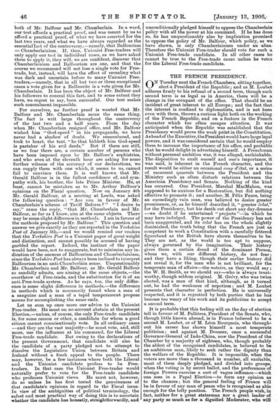THE DUTY OF UNIONIST FREE-TRADERS.
WE should have thought that the advice we tendered last week to Unionist Free-traders as to their action at the polls was so clear that it could not he misunderstood. We urged on them the duty of making their Free-trade views effective. As will be seen, however, from letters from Unionist Free-traders which we publish in another column, our advice seems in certain cases to have missed the mark. Needless to say, we do not regret or resent these protests. On the contrary, we have received them with unqualified satisfaction, for they show a vigour and determination for which we were hardly prepared. Let us once more try to make our position clear.
As we have said, the essential part of our advice to Unionist Free-traders is to make their Free-trade views effective,—that is, to vote for no one who is not a Free-trader. But such advice requires a practical interpretation, because there are plenty of candidates (Mr. Balfour is the notorious example) who call them- selves Free-traders, and are in reality nothing of the kind, but instead are essentially opposed to Free-trade. In the mouths of such men Free-trade is but an alias for Pro- tection. Considering the ambiguities of political ter- minology, we suggest that the only safe test is for every Unionist Free-trader to ascertain whether the Unionist candidate who calls himself a Free-trader is willing to pledge himself unconditionally to oppose the Chamber- lain policy with all the power at his command. Unless he is willing to do that, he cannot be regarded as a Free-trader, or a person, whatever may be his views on the Union or other questions, for whom a Unionist Free-trader can vote. Mr. Balfour and the great bulk of his followers have clearly refused to give any such pledge, and are, therefore, not fit persons to receive the votes of Unionist Free-traders. The fact that they may have expressed a few hesitating doubts as to the practica- bility of the Chamberlain policy, or that they may have refrained from expressing approval of it, is nothing to the purpose. Such partial hedgings do not in the very least clear them from the stain of opposition to Free-trade. In other words, the mere refusal to applaud or approve Chamberlainism is no sort of guarantee that the candi- date can receive the confidence of Free-traders. Nothing less than the unconditional pledge to oppose Chamber- lainism is of any value.
But though, as we have said, our test rules out Mr. Balfour and the great bulk of his followers, there are a few, a very few, cases of Unionist Free-traders who, strangely as we think, can still reconcile it with their convictions to call themselves Balfourites. Lord Hugh Cecil is the capital example,—the example which was in our mind when we wrote last week. He still, astonishing as it may seem, declares himself a loyal follower of Mr. Balfour, but he is also willing and ready to pledge himself uncon- ditionally to oppose Mr. Chamberlain. He and any others, if there be others, who take up his position may, we think, be honestly supported by Unionist Free-traders without incurring the responsibility of furthering Protection. We do not assert that giving support to a candidate who pro- fesses loyalty to Mr. Balfour in any shape or form would be an easy task to fulfil, but in a crisis like the present we have to consider how the majority of Unionist Free-trade votes can be secured for Free-trade ; and in view of this fact, we hold that it would be unreasonable, and would. result in injury to Free-trade, if we declared that a man must forfeit the right to be called a Free-trader because he indulges honestly and conscientiously in what we are certain is a delusion in regard to Mr. Balfour.
For ourselves, we are so confident that Balfourism and Chamberlainism are one and the same thing that we believe that the practical result of our test, when applied, can only be to unmask Balfourism, and to show that in the vast majority of cases Balfourism is, as we have always declared, merely a tepid, but none the less dangerous, form of Chamberlainism.- We consider, remember, that Retaliation is as open to objection as is Protection.—Take the specific case put before us by one of our correspondents,—the case of the City of London. Sir Edward Clarke and Mr. Gibbs have neither in their speeches nor in their addresses pledged themselves unconditionally to oppose the Chamberlain policy. They are therefore not fit persons to receive the votes of any Unionist Free-trader. Take as another example the case of Mr. Brodrick. Mr. Brodrick has not declared his determination to oppose the Chamberlain policy with all the strength at his command. He therefore, though he has sometimes usurped the name of Free-trader, cannot receive support from true Unionist Free-traders, but must be opposed by them to the utmost. Our readers will, we are convinced, find that our test will not in practice deflect votes from Liberals, except in the one or two cases, like that of Lord Hugh Cecil, where a genuine Free-trader, out of some strange idiosyncrasy which we do not profess to be able to understand, clings to a declaration of abstract loyalty to Mr. Balfour. It is an ideal Mr. Balfour, not the real Mr. Balfour, who thus secures their fidelity. They may call themselves Balfourites, but just as Wilkes declared that he was never a Wilkesite, so in this sense Mr. Balfour would be forced to say—could he be compelled to make a plain declaration—that he is not a Balfourite. What makes us feel that it is absolutely safe for us to say that such candidates as Lord Hugh Cecil should receive the support of Unionist Free-traders, if they unconditionally pledge themselves to oppose the Chamber- lain policy, is our firm and unshakable conviction that Balfourism and Chamberlainism are in essentials the same, and that no man can give the anti-Chamberlain pledge without in reality divesting himself of every shred of Balfourism, using that word in the true sense, and without divesting himself also of the support of all the Protectionist elements, whether nominally Balfourite or Chamberlainite, in the constituency for which he was standing. As we see in Greenwich, and in one or two other constituencies, the moment a candidate honestly repudiates Chamberlainism, and offers it a strenuous opposition, he ceases to get the support of the followers both of Mr. Balfour and Mr. Chamberlain. In a word, our test affords a practical proof, and was meant by us to afford a practical proof, of what we have asserted for the last.two years, and what we have always regarded as the essential fact of the controversy,—namely, that Balfourism = Chamberlainism. If, then, Unionist Free-traders will only apply our test in individual cases, as we have asked them to apply it, they will, we are confident, discover that Chamberlainism and Balfourism are one, and that the course we recommend will not lose a single vote for Free- trade, but, instead, will have the effect of revealing what was dark and uncertain before to many Unionist Free- traders,—namely, that in all but two or three exceptional cases a vote given for a Balfourite is a vote given for Mr. Chamberlain. It has been the object of Mr. Balfour and his followers to conceal this fact, and to some extent they have, we regret to say, been successful. Our test makes such concealment impossible.
For ourselves, no further proof is wanted that Mr. Balfour and Mr. Chamberlain mean the same thing. The fact is writ large throughout the controversy of the last two and a half years. From the day when Mr. Chamberlain resigned office, and Mr. Balfour wished him " God-speed " in his propaganda, we have never had a shadow of doubt. We remembered, and took to heart, the text, " he that biddeth him God-speed is partaker of his evil deeds." But if there are still, as we fear there are, a certain number of persons who have been imposed upon by Mr. Balfour's sophistries, and who even at the eleventh hour are asking for some further witness of the accuracy of our declarations, we can supply them with one which, it seems to us, cannot fail to convince them. It is well known that Mr. Gerald Balfour is in the fullest confidence of, and sym- pathy with, his brother, the late Prime Minister. He, at least, cannot be mistaken as to Mr. Arthur Balfour's opinions on the Fiscal question. Now on January 4th Mr.. Gerald Balfour, at a meeting at Leeds, was asked the following question : " Are you in favour of Mr. Chamberlain's scheme of Tariff Reform ? " " I desire to say," came the reply, "that Mr. Chamberlain and Mr. Balfour, so.far as I know, aim at the same objects. There nay be some slight difference in methods. I am in favour of the methods proposed by Mr. Balfour." This question and answer we give exactly as they are reported in the Yorkshire Post of January 5th,—and we would remind our readers that the Yorkshire Post is a Unionist paper of great weight and distinction, and cannot possibly be accused of having garbled the report. Indeed, the instinct of the paper would have been, not to exaggerate, but to minimise any in- dication of the oneness of Balfourism and Chamberlainism, since the Yorkshire Post has always been inclined to interpret Balfourism in an anti-Chamberlain sense. Unquestionably Mr. Chamberlain and Mr. Balfour, as Mr. Gerald Balfour so candidly admits, are aiming. at the same objects,—the overthrow of Free-trade, and the substitution for it of an anti-Free-trade system. As he says, too, the only differ- ence is some slight difference in methods,—the difference in methods which is necessarily found when a man of a sanguine and a man of a tepid temperament propose means for accomplishing the same ends.
Let us sum up once more our advice to the Unionist Free-trader. He must on no account abstain at the present Election,—unless, of course, the only Free-trade candidate is, for some reason or other, a candidate for whom a good citizen cannot conscientiously vote. In all ordinary cases —and they are the vast majority—he must vote, and, still more, use the influence at his command, for the Liberal Free-trade candidate. But owing to the declarations of the present Government, that candidate will also be the candidate of a party pledged not to attempt to dissolve the Legislative Union between Britain and Ireland without a fresh appeal to the people. There may, however, be a few instances where both the Liberal and the Unionist candidate profess to be Free- traders. In that case the Unionist Free-trader would naturally prefer to vote for the Free-trade candidate who professes Unionist views. He must not, however, do so unless be has first tested the genuineness of that candidate's opinions in regard to the Fiscal issue. In view of the ambiguities of political terminology, the safest and most practical way of doing this is to ascertain whether the candidate has honestly, straightforwardly, and unconditionally pledged himself to oppose the Chamberlain policy with all the power at his command. If he has done so, he has unquestionably also by implication promised to oppose the policy of Mr. Balfour, which policy, as we have shown, is only Chamberlainism under an 'alias. Therefore the Unionist Free-trader should vote for such a Unionist Free-trade candidate. In all other cases he cannot be true to the Free-trade cause unless he votes for the Liberal Free-trade candidate.











































 Previous page
Previous page